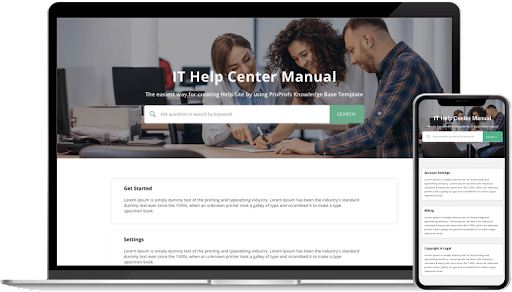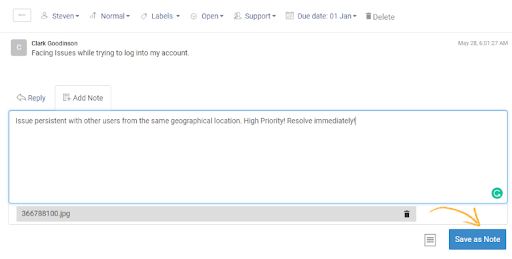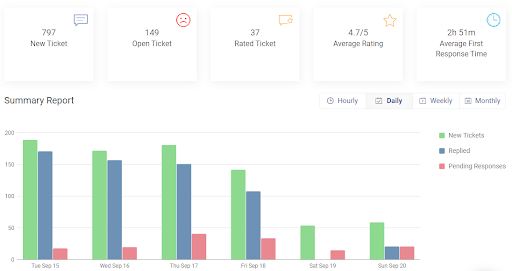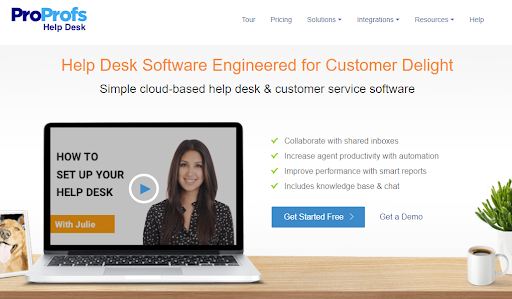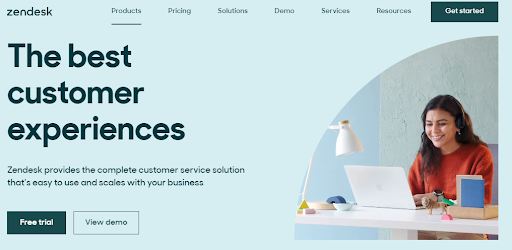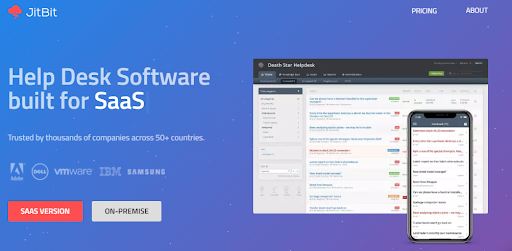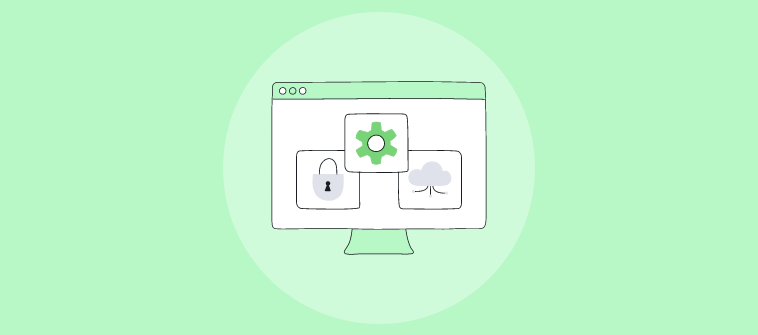Even a day-old startup wants to grow its operations and become a multi-million dollar brand. But as you look to grow your business, do things get easier? Not really!
With a big business comes big responsibilities and even bigger challenges.
Enterprise organizations often struggle to meet user expectations. In addition to hundreds of customer complaints, you need to assist thousands of employees with simple support issues such as a slow internet connection.
Enterprise help desk software is designed to solve the key support challenges of large and rapidly expanding companies. And with the right provider, they’re easy to implement at scale.
In this blog, we will explore the answer to a very important question- “What is an enterprise help desk?” and see what benefits it offers to big corporations.
Let’s do this!
What Is an Enterprise Help Desk?
An enterprise help desk software is an all-in-one support platform for providing assistance to both your external customers as well as internal employees. An enterprise help desk covers multiple channels such as email, live chat, phone, etc., and gives you the option to create an extensive self-service portal or help center.
Now that you have explored the definition of an enterprise help desk, you must be wondering– “Well, wait a minute. How is it any different from normal help desk software?
Read More: 20 Best Help Desk Software of 2024
An enterprise help desk is similar to general help desk tools; however, it is built to scale. In other words, it is designed to help large corporations that have over 1000+ employees manage all their support requirements with ease.
The enterprise service desk is being used, globally, across a number of industries that value quality assistance for their customers as well as employees. Some departments that benefit the most from this tool are customer service, IT support, facilities management, human resources, etc.
What Does an Enterprise Help Desk Software Do?
If you are an enterprise, you obviously have bigger teams and an even bigger customer base to take care of. This simply means that you will have to manage an endless number of issues and requests on a daily basis.
This is exactly where an enterprise help desk ticketing system comes in and helps you rise above support challenges. With an automated workflow, your support team can cater to more end-users than they normally would using mundane or manual processes. They can assign tickets to other departments, prioritize urgent support requests, and share relevant solutions over multiple communication channels. Our email-based ticketing system is designed to be user-friendly and is as easy as using Gmail. ProProfs Help Desk simplifies your workflow by automatically converting incoming emails into support tickets.
Similarly, enterprise leaders can work on the bigger goal of offering delightful support 24×7. They can create a support workflow and infrastructure that is fast, reliable, and less expensive for uninterrupted business operations and growth.
Read More: 15 Help Desk Best Practices & Principles
Top Enterprise Help Desk Features
- Omnichannel support: Give your support reps the context they need to resolve issues. They can easily manage support conversations on multiple channels including chat, email, phone, etc. for a great omnichannel experience.
- Ticket management: Enterprise ticketing systems ensure that support issues or requests can be automatically converted into unique tickets. These tickets can then be easily assigned to relevant agents or teams, organized using tags or labels, and prioritized for effective ticket management.
- Easy-to-use interface: Your ideal enterprise ticket management system should offer a user-friendly interface. This will help your team save time on training sessions and get started in a matter of minutes.
- Self-service features: An enterprise help desk gives you the option to create an extensive knowledge base. Your employees and customers can find relevant help in the form of help articles, FAQs, videos, guides, etc.
- Reports & analytics: Understand loopholes in your process and see how you can improve them. Capture relevant service metrics such as average response times, CSAT, employee satisfaction, NPS, and more.
5 Benefits of An Enterprise Help Desk System
Whether it is about resolving a simple password-reset request from an employee or managing an angry customer, an enterprise ticketing system can come to your rescue. Let’s take a look at some more benefits in detail:
1. Use Automation to Boost Performance
As discussed above, managing a huge influx of support tickets can be a nightmare for any enterprise. You simply cannot address each and every issue if you still use manual methods for ticket management.
So what can you do to rise above mundane and cumbersome tasks?
Enterprise help desk systems can help you automate a majority of your workflows to save time, minimize efforts, and reduce human errors. For instance, with the automated ticket assignment feature, tickets can be automatically assigned to the agents who have the relevant skills to handle them.
Moreover, you can share automated notifications and alerts with your customers and staff members for updating them on new ticket creation, new ticket assignments, internal notes, and more.
Help desk users can also choose to share automated feedback surveys with end-users to gauge satisfaction and allow them to rate their overall experience.
2. Promote Self-Service With an Extensive Knowledge Base
Did you know that more than 60% of Americans prefer solving basic customer service issues through a self-service website or app?
Enterprise help desk tools give you the option to create an extensive knowledge base that hosts support content in the form of FAQs, guides, video tutorials, articles, and more.
Your knowledge base isn’t just helpful for customers but also useful for your internal staff members. A well-structured, clearly documented, and mobile-optimized knowledge base can help customers resolve their queries by themselves.
In addition to this, it even acts as a learning tool for new staff members and can be updated by your existing staff from time to time. For instance, if a support rep comes across a new issue, he can make a copy of the offered resolution and turn that into a knowledge base article.
3. Collaborate Across Teams & Get More Done
Internal teams can have a difficult time communicating with other departments, delegating tasks, and tracking work that involves more than one department.
On the other hand, effortless collaboration among team members means that your business is moving in the right direction. Members from different teams can communicate in real-time and get more done together.
For instance, you can use the internal notes feature to add comments and discuss tickets internally.
Notes can also be used to update other agents about a particular ticket. For instance, if there is an issue that is being faced by only a certain geographical area, the agent can leave a note for other agents to see.
Even new tickets can be assigned to multiple teams or departments. For instance, if there is a request for the refund of a product, the single ticket can be assigned to the billing or returns department, the logistics department, etc.
4. Offer Seamless Support Experiences
The quality of service you provide to your customers has the power to influence their buying decisions. Similarly, for employees, a seamless support experience means fewer obstacles in their day-to-day operations and enhanced productivity.
What does a seamless experience look like?
A seamless experience is one where the service requester is offered a uniform response across multiple communication channels. Moreover, whether users contact your business from their phone, laptop, or tablet, the experience should be the same.
In addition to offering an omnichannel experience, you can use an enterprise help desk to set Service Level Agreements (SLAs). Well-defined SLAs help your agents and managers in maintaining a certain quality of support and track SLA violations from a single platform.
5. Measure Key Metrics & Improve Performance
In order to improve your support operations, you need to constantly track the right data and create strategies to improve performance.
Here are some top support metrics or key performance indicators (KPIs) that you can measure using enterprise help desk software:
- First Contact Resolution: The number of tickets resolved upon first interaction with a user.
- Ticket Backlogs/ Pending Tickets: The number of new tickets that are yet to be resolved.
- Average Resolution Time: The time taken on average to resolve a support ticket.
- User Satisfaction: Measure how satisfied employees and customers are with your service.
You can customize these reports to view daily, weekly, or monthly performance. Moreover, you can even share insightful reports and analytics with key stakeholders such as business clients, inventors, partners, etc.
Read More: 15 Help Desk Metrics to Improve Customer Support
Examples of Top 3 Enterprise Service Desk Software in Business [2023]
Most SaaS companies fail when it comes to meeting the needs and expectations of large businesses. However, here are the top 3 enterprise help desks that have stood the test of time and can be the right solution for your ever-growing business. Let’s explore these tools.
1. ProProfs Help Desk
ProProfs Help Desk is an enterprise customer service software designed keeping in mind the needs of any rapidly expanding business. With its flexible pricing plans, you can always look to move up the ladder and offer 24×7 reliable support to all key stakeholders.
- Easily collaborate across departments using internal notes, parent-child ticketing, canned responses, and more
- Use smart reports and analytics to measure individual and team performance
- Automate your support workflow and resolve tickets faster
- Reduce internal as well as external support tickets by creating a dedicated knowledge base or help center
2. Zendesk
Zendesk equips enterprise organizations with all the tools they need to segment, personalize, and respond to customers on their preferred channels. The tool is extremely scalable and can match the growing needs of any business. Let’s check some more features:
- Give agents the context they need to handle customer requests
- Automate your support process with AI-powered bots
- Easily escalate issues or requests to the right agent suited to help or the most relevant team
- Create a unified view of the customer for more personalized interactions
Recommended Read: Best Zendesk Alternatives
3. JitBit
JitBit is another powerful enterprise help desk that can work great for your team. The company offers its help desk in two versions- the cloud-based version (hosted by JitBit) and the self-hosted version (installed on your own hardware). Here are some notable features that JitBit brings to the table:
- Track company assets and assign assets to users or tickets
- Set agent roles and permissions and decide their level of access to the tool
- Use canned responses for faster replies
- Android and iOS apps to offer reliable support on the move
Grow Beyond Limits With Enterprise Help Desk Software
No matter if you’re a high-growth innovator or an established firm undergoing transformation, enterprise help desk software can allow you to support your customers and employees with ease.
You can enhance productivity with automations, seamlessly collaborate across teams with internal collaboration features, and promote self-service with a full-fledged knowledge base. Moreover, you can keep a tab on important support metrics such as average response times, ticket backlogs, resolved tickets, CSAT, NPS, and others.
The right enterprise help desk can make your millions of customers feel like one in a million.


